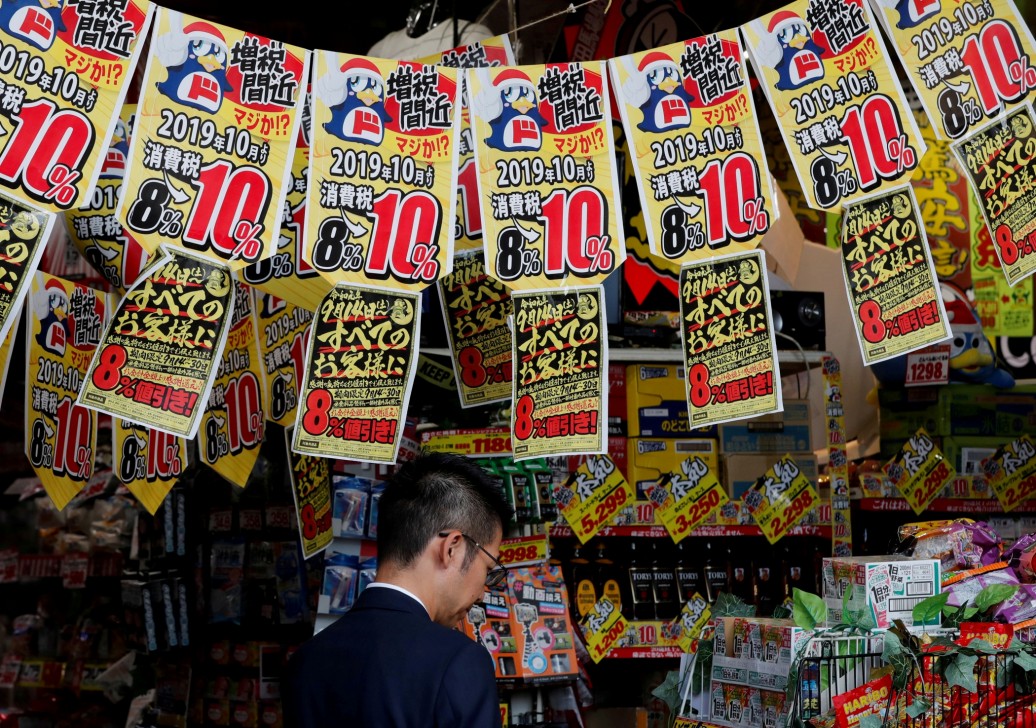Japan firms see ‘Abenomics’ sputtering, tax hike hurting economy

Japanese companies overwhelmingly think the nation’s longest postwar expansion is peaking, with two-thirds expecting a tax hike imposed this month by Prime Minister Shinzo Abe to hurt the economy, a Reuters poll showed on Friday.
Almost all the firms in the monthly Reuters Corporate Survey said the world’s third-biggest economy will level off or fall into recession in coming months, which would mark an end to the “Abenomics” expansion that the premier launched in late 2012.
And while most of the firms still don’t want the Bank of Japan to increase its stimulus, that opposition has weakened sharply over the past quarter as the U.S-China trade war has clouded prospects for global growth and export-reliant Japan.
Abe says the increase in the national sales tax, which he had twice delayed, is crucial to reining in the industrial world’s heaviest debt burden - more than twice Japan’s annual $5 trillion output. But the higher levy could cool consumer spending, triggering a recession, analysts fear.
The Reuters survey found 69 percent of firms expect the tax hike to weigh on growth, 26 percent see no impact and 5 percent think it could boost the economy.
“The tax hike will hurt consumer sentiment considerably, which will exert an unpredictable impact on the Japanese economy,” a manager at a food-processing company wrote in the survey.
Some 58 percent expect the economy to level off heading into next year, while 41 percent predict a recession, the survey found. Just 1 percent see the economy growing after the tax increase.
Economists in a Reuters poll last month forecast the economy will grow 0.8 percent in the fiscal year to March, up from the 0.5 percent predicted a month earlier.
“A combination of a post-tax hike decline in demand and a sputtering global economy will clearly exert downward pressure on Japan’s economy,” said Yoshimasa Maruyama, chief economist at SMBC Nikko Securities.
He forecasts a recession for Japan, with the economy contracting for the two quarters through March. Companies in the Reuters survey that expected a recession largely think it will last at least a year, with a quarter expecting it to hit bottom late next year and 56 percent seeing the slump dragging into 2021 or beyond.
Japan’s coincident economic indicator fell in August, the Cabinet Office said this week, downgrading its assessment of the key gauge to “worsening,” which can presage a recession. Last month the office maintained its overall assessment that the economy continues to recover moderately.
The Reuters Corporate Survey, conducted Sept. 26-Oct. 7 for Reuters by Nikkei Research, canvassed 504 big and midsize nonfinancial companies, of which 230-240 firms responded to the various questions, on condition of anonymity.
As the economic outlook clouds, opposition to further easing from the central bank is waning, the survey found.
Haruhiko Kuroda, installed by Abe as BOJ governor six and a half years ago to spur growth and end decades of deflation, has driven the most aggressive asset purchases among major central banks, pushing some interest rates below zero.
But while Kuroda vowed to stoke inflation to 2 percent in two years, the BOJ has generated price rises of less than half of that, while ultra-low interest rates are hurting banks by crimping lending margins.
